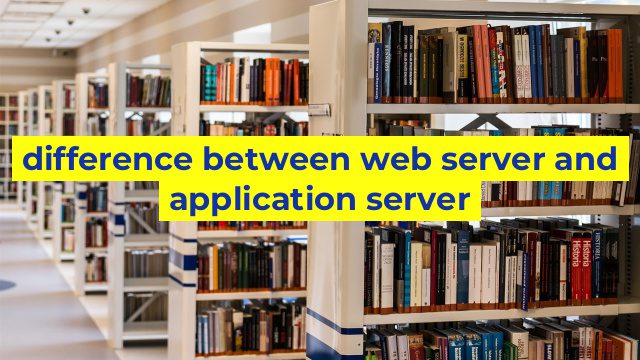The Difference Between Web Server and Application Server
When it comes to hosting web applications, many people use the terms “web server” and “application server” interchangeably. However, these two types of servers play different roles in the application architecture. Understanding the difference between these two can help you make an informed decision about the type of server to use for your project.
Web Server
A web server is a server that is responsible for serving static web content, such as HTML, CSS, and JavaScript files, to web browsers. When you type a URL into your browser, the web server receives the request and serves the appropriate webpage. Web servers are capable of handling thousands of requests per second and are optimized for delivering static content efficiently.
Web servers can be either hardware or software. Many websites are hosted on software web servers like Apache, Nginx or Microsoft’s IIS. They run on a single physical server and serve all the requests for static content on a website.
Application Server
An application server, on the other hand, is a server that provides a platform for running dynamic applications. These applications are built using programming languages like Java, Python, Ruby, and more. Application servers handle requests for dynamic content and process business logic.
Application servers provide additional services like security, transactions, and messaging. They allow developers to focus on writing business logic and leave the infrastructure concerns to the application server. Application servers can be used to host multiple applications and are designed to handle more complex requests with a mix of dynamic and static content.
The Bottom Line
In summary, web servers are responsible for serving static web content while application servers provide a platform for running dynamic applications. If your application requires complex logic and functionality, you should consider using an application server. If your application is simple and only requires simple webpages, then a web server will suffice. Understanding the difference between web servers and application servers is important when building a web application as it can help you make the right decision for your needs.
Table difference between web server and application server
| Aspect | Web Server | Application Server |
|---|---|---|
| Definition | A program that delivers static content, such as HTML, images, and CSS files, to a client, typically a web browser. | A software platform that provides an environment in which applications can be deployed, run, and managed. |
| Functionality | Responsible for serving and processing HTTP requests, handling static content, and passing dynamic content requests to an application server. | Provides various services such as transaction management, security, messaging, object pooling, and database connectivity, in addition to handling HTTP requests. |
| Examples | Apache, Nginx, Microsoft IIS | JBoss, Tomcat, WebSphere |
| Deployment | Installed on a separate machine or a separate instance from the application server. | Installed on the same machine as the application server, or on a separate machine where the application server can access it. |
| Scalability | Can be easily scaled by adding more web servers behind a load balancer. | Can be scaled by adding more application servers behind a load balancer, but this requires more configuration and management than scaling web servers. |
